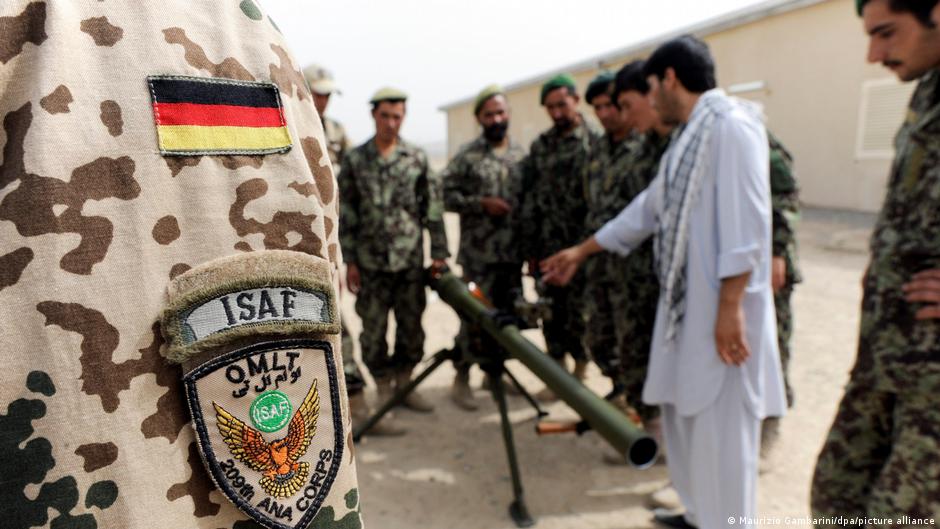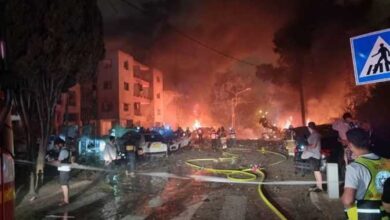
Sekandar (name changed), who lives in Kabul, started working in 2019 as an interpreter for US Special Forces at Bagram Airbase, the largest US military base in Afghanistan. He told DW that he faces a dangerous situation now.
“NATO and US forces are withdrawing completely from Afghanistan; I am concerned about my future,” he said.
“I don’t know what happens to us now,” he added.
Sekandar said the nature of his work with the US mission had left him in a bad mental state.
“I used to accompany US forces on their night missions. I have seen many dead and wounded people. I am now suffering from mental health issues,” he said.
Sekandar lost his job in 2021 as a result of the coronavirus pandemic. But he says that the number of military operations by US forces had already fallen after Washington and the Taiban signed a deal in Qatar in February 2020 to end the protracted conflict.
“I cannot travel, and I am not safe in Kabul,” he said.
Another former NATO worker who asked not to be named for security reasons told DW that the Taliban, al-Qaida and the Islamic State (IS) consider the alliance’s Afghan employees to be enemies.
“If they know where I worked, they would kill me,” he said.
Possible targets
After the US invaded Afghanistan in 2001 and dismantled the Taliban regime, foreign forces relied heavily on domestic help. They needed translators, interpreters, cooks, cleaners, as well security experts who could help them understand the political and security dynamics of the country.
The Taliban view them as “traitors” who helped foreigners consolidate their “illegal” occupation.
After almost two decades of war, President Joe Biden has announced that all US forces will leave Afghanistan by September 11. Other NATO allies, including Germany, agreed to leave the country following US move.
The unconditional departure of foreign troops from Afghanistan will leave NATO’s regional workers in a difficult position.
Kamal Sadat, a former deputy minister for youth, told DW that NATO’s Afghan employees are likely to suffer after the withdrawal of foreign forces.
“Once they leave, former local employees will become easy targets for insurgents because they consider NATO’s Afghan employees as foreign targets,” Sadat said.
“Also, those who have fled the country are worried about their families back home because they are still at risk,” he added.
Western assurance
Many NATO member states say they are trying to help their employees in Afghanistan, such as by potentially offering them asylum in the countries whose forces employed them.
Defense Minister Annegret Kramp-Karrenbauer told media on Sunday that Germany would be willing to take in Afghan nationals who helped the Bundeswehr during the war.
A procedure for admitting Afghan staff who need refuge already exists in Germany — although there are a number of disputed cases. According to the Defense Ministry, 781 people have been approved for residency since 2013. It is, however, unclear how many local employees are still left in Afghanistan.
Kramp-Karrenbauer wants the existing process to be streamlined and accelerated. The Welt am Sonntag newspaper, citing the Interior Ministry, reported that Germany plans to set up an office in Kabul and probably also one in Mazar-e-Sharif in northern Afghanistan to help process cases.
Easier said than done
Not all Afghans who worked for NATO in different capacities meet the criteria to apply for asylum programs. Some locals worked for foreign forces for only a few months and don’t meet the criterion of one or two years of employment with NATO forces. They are still a target for militants, who are not interested in the duration of their NATO employment.
Some don’t have contracts or recommendation letters from their employers. They are also in a precarious situation now.
There are employees whose asylum applications have been approved, but they are unsure how long it will take for them to complete the process of interviews and visa issuance. Will they be able to leave Afghanistan before September 11?
Western governments say the unconditional withdrawal of troops will not result in more violence and bloodshed as they are leaving behind a strong Afghan army. Thomas Silberhorn, a member of the Bundestag and Parliamentary State Secretary at Germany’s Ministry of Defense, recently told DW that NATO has done a “brilliant job” of preparing Afghan forces to secure the country by themselves.
But Mohammad Shafiq Hamdam, a Kabul-based security expert, has a different view of the situation.
“Afghan security forces are financially and militarily dependent on the US,” Hamdam said, “and, without its support, they will be in a tough spot.”
The Taliban are not the only threat to Afghan forces; militant groups such as Islamic State have also gained a foothold.
“The Taliban are stronger than ever. IS and other terrorist groups have gained a foothold in Afghanistan. Therefore, the consequences of a hasty and irresponsible withdrawal from Afghanistan could be dangerous not only for Afghanistan but also for the region and the world,” Raihana Azad, a member of the Afghan parliament, told DW.
By Shamil Shams, Masood Saifullah




